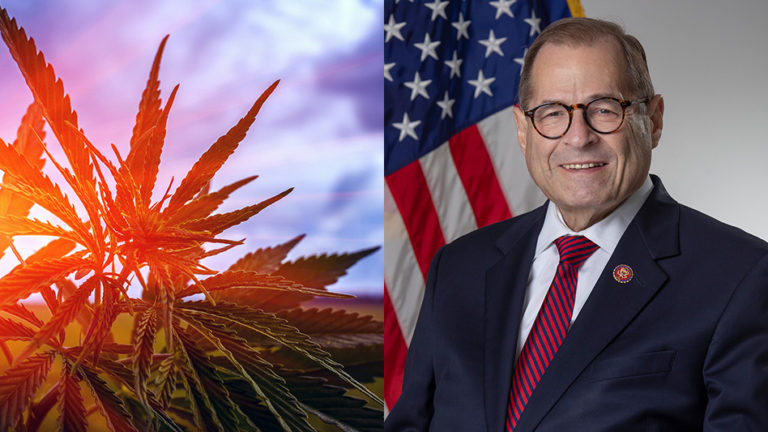
[ad_1]
Just as major movement on incremental cannabis reform to allow industry banking got teed up in the U.S. Senate, a ranking member in the U.S. House created new thunder with his reintroduction of a broader legalization bill.
Rep. Jerry Nadler, D-N.Y., the top Democrat in the U.S. House Judiciary Committee, introduced the Marijuana Opportunity, Reinvestment and Expungement (MORE) Act on Sept. 20. The legislation (H.R. 5601) intends to legalize cannabis at the federal level through decontrolling and decriminalizing the plant, as well as provide expungements for certain cannabis offenses and create reinvestment opportunities for those adversely impacted by prohibition.
Notably, the bill was introduced with 33 original co-sponsors in the House, all of whom are Democrats, which is indicative of the legislation’s partisan history. Previous versions of the MORE Act have passed the U.S. House twice before, most recently in a 220-204 vote that fell almost entirely along party lines in April 2022.
“It is long past time for the federal government to recognize that legalization has been a resounding success, that the conflict with federal law has become untenable,” Nadler said before last year’s vote on the House floor. “Criminal penalties for marijuana offenses and the resulting collateral consequences are unjust and harmful to our society. The MORE Act comprehensively addresses these injustices.”
RELATED: U.S. House Passes MORE Act, Again
A legislative staffer with Nadler’s Washington, D.C., office confirmed with Cannabis Business Times that the 2023 text for the MORE Act is identical to the bill that passed last Congress on the House floor.
MOREAct_2023 by Tony Lange on Scribd
First introduced in July 2019, the MORE Act also passed the U.S. House via a 228-164 vote in December 2020: Only six Democrats and five Republicans strayed from their party lines in that vote.
Both passages came when Democrats owned a majority in the lower chamber, which is no longer the case this Congress. Presenting a major hurdle from the get-go, the 2023 iteration of the bill faces an immediate test in the Judiciary Committee, which is now chaired by Jim Jordan, R-Ohio, who voted against the MORE Act in both the 2020 and 2022 roll calls.
In addition to the House Judiciary, the 2023 MORE Act has been referred to eight other committees in the lower chamber.
In addition to ending the federal prohibition of cannabis, the MORE Act intends to impose a federal tax on cannabis sales (starting at 5% for the first two years and increasing to 8% by the fifth year of implementation). Revenue from this tax, in part, would go toward addressing the needs of communities that have been “seriously” impacted by federal prohibition policies, including aiding in the increased participation of communities of color in the burgeoning cannabis market, according to Nadler.
Under the bill, cannabis tax revenue would go into an “Opportunity Trust Fund,” from which 60% would go to the U.S. Attorney General’s office to carry out portions of the Omnibus Crime Control and Safe Streets Act of 1968, which is designed to assist state and local governments in reducing the incidence of crime and to increase the effectiveness, fairness and coordination of law enforcement and criminal justice systems at all levels of government. More definitively, the money would primarily be used for community reinvestment grants and drug treatment programs.
In addition, the bill would authorize the appropriation of $10 million for the National Highway Traffic Safety Administration to conduct a study on technologies and methods that law enforcement may use to determine whether a driver is impaired by cannabis.
The MORE Act also aims to direct the National Institute for Occupational Safety and Health (NIOSH) to conduct a study on the impact of legalization to the workplace, using states that have legalized adult-use cannabis as a guide, and requires NIOSH to develop best practices for employers as companies transition their policies related to cannabis, prioritizing employers engaged in federal infrastructure projects, transportation, public safety and national security.
The bill also directs the Department of Education to conduct a study on the impact of legalization to schools and school-aged children, again, using states that have legalized adult-use cannabis as a guide, and requires the Department of Education to develop best practices for educators and administrators to protect children from any negative impacts.
Nadler’s reintroduction of the MORE Act comes on the eve of next week’s Senate Banking Committee markup for the Secure and Fair Enforcement Regulation (SAFER) Banking Act, incremental reform that would provide safe harbor to financial institutions wishing to service the cannabis industry.
[ad_2]
Source link